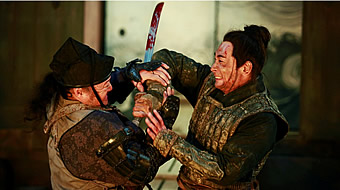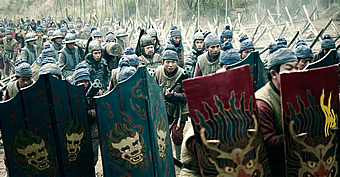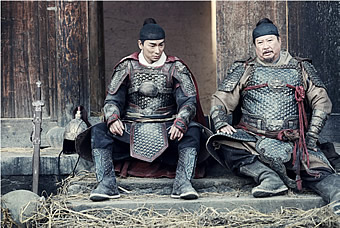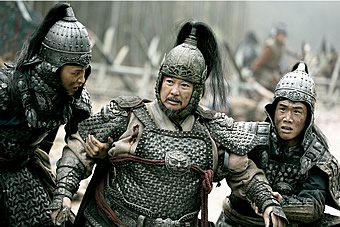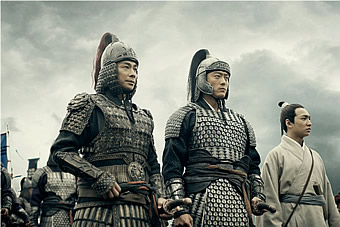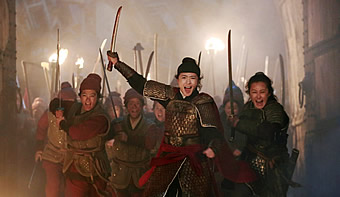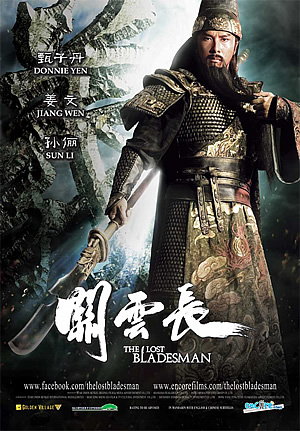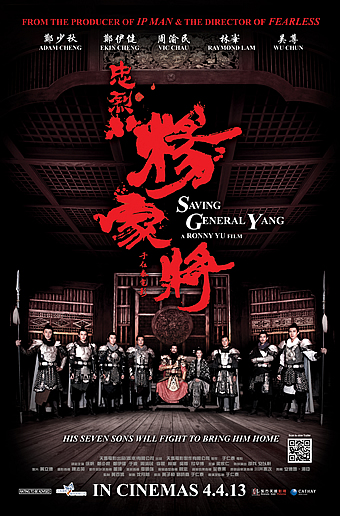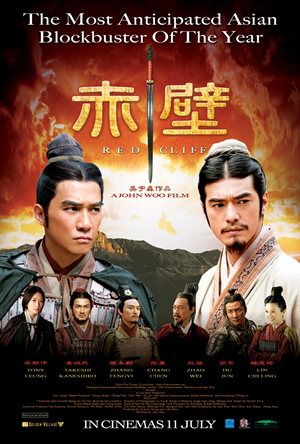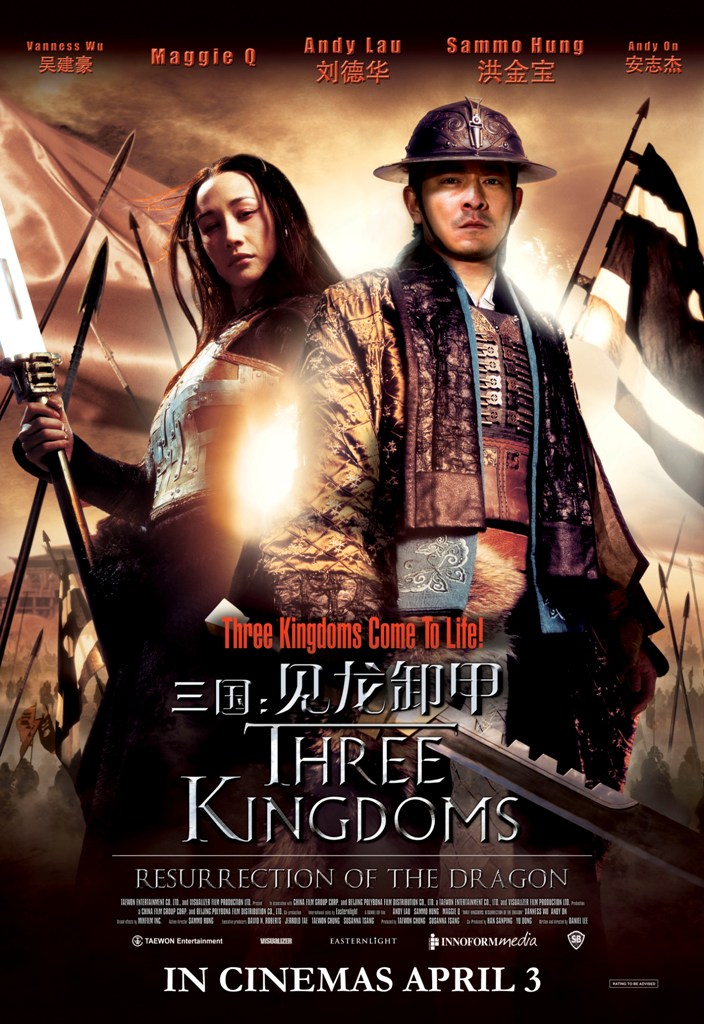GOD OF WAR (荡寇风云) (2017)
Genre: War/Action
Director: Gordon Chan
Cast: Vincent Zhao, Sammo Hung, Wan Qian, Timmy Hung, Yasuaki Kurata, Koide Keisuke, Wu Yue, Michael Tong, Liu Junxiao, Ryu Kohata, Jiang Luxia
Runtime: 2 hrs 9 mins
Rating: NC16 (Violence)
Released By: Clover Films Pte Ltd, mm2 Entertainment Pte Ltd and Golden Village Pictures
Official Website:
Opening Day: 1 June 2017
Synopsis: During the 16th century, Japanese pirates proliferate along the Chinese coastline. In 1557, the pirates take over Cengang in Zhejiang. After months of futile advances, Commander Yu (Sammo Hung) finally defeats them under the leadership of newly promoted General Qi (Vincent Zhao). The pirates, however, manage to escape. No sooner has Qi identified the key weakness of the Chinese army than he starts remapping the coastal regions to eradicate the pirates. When he finds the villagers of Yiwu loyal and courageous, he drafts them into his own army which soon becomes a formidable force against the pirates, with tactics developed specifically against them. In 1561, the pirates regroup and once again attack the coastal cities of China. With both the cities of Xinhe and Taizhou under attack, Qi's army is caught between two fires. Even though most family members of his soldiers are located in Xinhe, Qi makes the tough decision to go to Taizhou and leaves his wife in charge of the fight against the pirates in Xinhe, knowing that the defeat of the pirates’ elite team in Taizhou will bring long lasting peace to the coastal cities. But one month into the battle of Taizhou, there is still no clear winner and loser....
Movie Review:
Not since John Woo’s ‘Red Cliff’ has there been such a compelling war epic as Gordon Chan’s ‘God of War’, which breathes new life into a genre that saturated Chinese cinema in the mid- to late-2000s but has since gone out of fashion as much due to budgetary reasons as audience indifference. Like Woo’s genre icon, Chan’s depiction of how the young, intelligent and fearless General Qi Jiguang (Vincent Zhao) defeated a hotchpotch of Japanese invaders laying siege of Zhejiang during the 16th century unfolds as a battle of wits between two military strategists – in this case, Jiquang on one hand and Kumasawa (Kurata Yasuaki) on the other – and emphasizes the importance of strategy over sheer might, numbers and firepower. Indeed, the crowning achievement here is how Jiquang eventually manages to lead an army of just 3,000 men, albeit highly disciplined and tightly knit, against the onslaught of 10,000 Japanese pirates, samurais and Ronins commandeered by the tactician Kumasawa and Master Yamagawa (Koide Keisuke) in the invasion of the coastal city of Taizhou in Zhejiang.
As repetitive as it may sound setting up the Japanese as the enemy, Chan and his four screenwriters avoid falling into the cliché of depicting them as ruthless aggressors who are out to oppress the Chinese people. Right from the start, the prologue makes it clear that the Japanese were able to take control of Cengang because they were aided by a group of Chinese who were unhappy with the Ming government and colluded with the invaders to bring down the Imperial dynasty. Along the way too, Chan contrasts the callous Ronins against the honourable Samurais, the former of whom had no qualms subjugating the local Chinese women to the disgust of the latter. Besides portraying a dignified side to the Japanese, Chan also casts Kumasawaas a wily and worthy adversary to Jiguang in wisdom and foresight, who quotes no less than from Sun Tzu’s ‘Art of War’ to rein in the ambitious but inexperienced Yamagawa from launching a foolish offensive against the Ming government.
There is no secret that the heroes here are Jiguang and his valiant troops, but in giving the other side its dues, Chan also makes the ensuing battle more authentic. For starters, it is evident why Jiguang’s predecessor, the veteran Commander Yu Dayou (Sammo Hung), had repeatedly failed to breach the wall that the Japanese had built across a narrow gorge to secure Cengang – compared to his enemy, Yu was simply using blunt force and absolute numbers to counter the Japanese, which explained why his troops were whittled down from 20,000 men to 1,000 in just ten days. Contrast that to Jiguang’s new army (which he recruits from among the crude but loyal peasants of the village Yiwu), who not only trained in formation but also studied the methods and weapons of the Japanese in order to eventually out-smart, out-maneuver and out-strike them. Such attention to details demonstrates how Jiguang’s victory was no fluke, lending this retelling verisimilitude and ensuring that it is convincing, persuasive and compelling.
If it isn’t yet obvious, Jiquang is front-and-centre the lead protagonist of ‘God of War’; in fact, he is the metaphorical deity which the title alludes to, which Kumasawa explains at the end is intended as reference for he who prevails over chaos. That means Hung’s Commander Yu is but a supporting player who appears only in the first half-hour of the film – although those anticipating the first-ever pairing of the two genuine martial arts actors will still not go away disappointed as Zhao and Hung go up against each other in a gripping, albeit friendly, competition between them with wooden staffs. That also means there is more space and time for an intimate portrayal of Jiquang, which Chan spends on detailing the relationship between him and his headstrong wife (Wan Qian) as well as the larger political context with Zhejiang’s Supreme Commander Hu and the Ming government which he is forced to contend with. In the hands of a lesser director, these personal and professional facets of Jiguang’s life amidst his military accomplishments might have been distractions, but Chan juggles them assuredly to give texture and nuance to his central character.
Even as he emphasizes plot and character, Chan does not neglect the large-scale battle sequences that genre audiences will no doubt be looking forward to. In contrast to his VFX-heavy ‘The Four’ trilogy, Chan keeps the visual effects practical and restrained here, preferring instead to ensure realism than pure spectacle in the action. That doesn’t mean it isn’t thrilling, but rather that the fighting, firing and explosions never go overboard. That same sensibility extends to Jiguang’s moves, which are impressive but never exaggerated to draw attention to Zhao’s physicality or outsize Jiguang’s contributions in a victory that belongs as much to him as to his men. Notwithstanding, Zhao still wows in a couple of scenes that show off with his dexterity with all manner of weaponry, and that is in addition to two extended one-on-ones he gets with Sammo Hung and Sammo’s son Timmy Hung (who plays the leader of a group of disgruntled miners named Dacheng whom Jiguang courts to join his new army). Zhao is also in finer form than ever as Jiguang, and what the squeaky-clean actor may lack in terms of depth, he definitely makes up for in poise, sincerity and conviction.
Frankly speaking, we were genuinely surprised by how excellent ‘God of War’ turned out to be. Though it could easily have been a one-sided portrait of Chinese heroism, Chan doesn’t belittle, demean or humiliate the Japanese adversaries, representing them as crafty equals in intellect and strategy. Similarly, as easily as he could have valorized Jiguang, Chan keeps his achievements in proportion for a fuller but more well-rounded representation of what he stood for, the circumstances he had to deal with and the steps he took to overcome these obstacles in building up a formidable fighting force. And last but not least, Chan combines plot, character and spectacle into a coherent whole that is gripping, moving and thrilling to watch. It may lack the scale of ‘Red Cliff’, but it is by no means lesser, and like we said at the start, is pretty much the gold standard of war epics. If this doesn’t revive interest in the genre, we’re not sure if any other movie will.
Movie Rating:




(As sumptuous, satisfying and splendid as Chinese war epics come, ‘God of War’ turns what could have been a one-sided portrayal of Chinese heroism into a thrilling battle of wits between equals, while never losing the genre’s raison d'etre of battle spectacle)
Review by Gabriel Chong
You might also like:

Movie Stills
